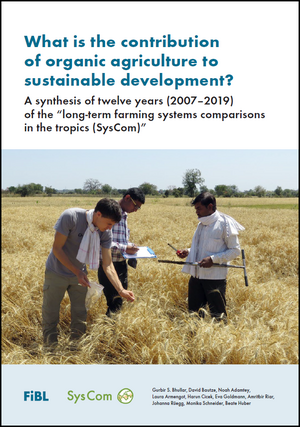The results of 12 years of comparative farming systems research in Kenya, Bolivia, and India provide scientific evidence on economic and ecological sustainability of organic and conventional systems. They illustrate how organic systems and other agroecological approaches can contribute to the SDGs by 2030.
The conference addressed whether organic agriculture is a realistic pathway for smallholders in the Global South and if it can support the transformation of food systems. Furthermore, it addresses some key issues of the SDG's such as responsible consumption and production as well as eliminating poverty and hunger.
The results of the report will be reflected in the view of the Committee on World Food Security (CFS) with regards to its work on agroecology.
Facebook Live Streaming
Resource:
RIOA (2021) What is the contribution of organic agriculture to sustainable development? A synthesis of
twelve years (2007-2019) of the “long-term farming systems comparisonsin the tropics (SysCom)”.
Gurbir S. Bhullar, David Bautze, Noah Adamtey, Laura Armengot, Harun Cicek, Eva Goldmann, Amritbir Riar, Johanna Rüegg, Monika Schneider, Beate Huber (2021). Research Institute of Organic Agriculture, Frick, Switzerland, 40 pages
The SysCom team published a first report which provided a comprehensive synthesis of the scientific findings of SysCom. The report is presented in a form that is easy to understand for an ‘educated non-expert’ audience. The findings address the differences between alternative (organic and agroforestry) and conventional production systems in terms of productivity, profitability, soil fertility and quality, and other indicators.
Facebook Live Streaming
- Christophe Larose, Head of Sector, INTPA F3 Sustainable Agri-Food systems and Fisheries
- Knut Schmidtke - Director of the Research Institute of Organic Agriculture, FiBL
- Christina Blank - Programme Manager of the Global Programme Food Security, Swiss Agency for Development and Cooperation
- Beate Huber - President, FiBL Europe
- Bernard Lehmann - Vice-Chairperson of the HLPE Steering Committee
- Monika Schneider - Country Leader SYSCOM Bolivia
- Noah Adamtey - Country Leader SYSCOM Kenya
- Gurbir Bhullar - Country Leader SYSCOM India, Lead author of the SYSCOM synthesis report
RIOA (2021) What is the contribution of organic agriculture to sustainable development? A synthesis of
twelve years (2007-2019) of the “long-term farming systems comparisonsin the tropics (SysCom)”.
Gurbir S. Bhullar, David Bautze, Noah Adamtey, Laura Armengot, Harun Cicek, Eva Goldmann, Amritbir Riar, Johanna Rüegg, Monika Schneider, Beate Huber (2021). Research Institute of Organic Agriculture, Frick, Switzerland, 40 pages
The SysCom team published a first report which provided a comprehensive synthesis of the scientific findings of SysCom. The report is presented in a form that is easy to understand for an ‘educated non-expert’ audience. The findings address the differences between alternative (organic and agroforestry) and conventional production systems in terms of productivity, profitability, soil fertility and quality, and other indicators.
- System-oriented pricing. For many organic farmers, premium prices are only available for certain cash crops destined for export markets (such as cocoa and cotton) and not for other crops in the rotation. A conducive policy environment providing production system-oriented pricing and/or compensation schemes will support profitable organic production systems that enhance livelihoods.
- Market linkages for diversified production. Organic farming and agroforestry systems offer a wider range of products than conventional farming based on monocultures. Organic farmers, therefore, need to be able to sell the different products they produce as ‘organic’. Reducing farmers’ dependency on particular (mostly export-oriented cash) crops will improve their livelihoods and support diversified farming systems. This requires a stimulating business environment that fosters market innovations and primes local markets for a diversified range of organic produce.
- Capacity building and extension services. Farm performance varies widely across different agricultural management practices and production systems, suggesting a lack in implementation of best practices. Capacity building on good management practices improves yields and reduces losses due to pests and diseases, thereby increasing farmers’ income. Policies should recognise the importance of know-how for the successful management of sustainable farms and prioritise capacity building for farmers. Organising farmers into cooperatives and (self-help) groups has the potential for building capacities e.g. through peer-to-peer learning as well as development and dissemination of innovative solutions.
- Technical innovations and medium-scale mechanization. Challenging labour requirements and declining labour availability force smallholders to either scale down their activities or opt for simpler farming systems, threatening food security and livelihoods. Technical innovations and medium-scale mechanisation adapted to the local conditions, reduce the need for manual labour, and are thus key to empower small scale organic farmers. Such innovations can help farmers to sustain and increase their activities, lower their production costs and improve their livelihoods and food security.
- Research gap. Critical gaps in research on the management of organic farms are a) soil fertility management, b) pests and diseases, and c) water management/drought. Holistic systems design, building on diversified, interlinked and thus complex production patterns, can address these challenges by considering a) optimising nutrient management, carbon storage and tillage practices, b) implementing a systems approach for pest and disease management, and c) setting up suitable water conservation systems. Research and technology development must acknowledge that resilience increases with the complexity of a system and strengthens farming to face the threats imposed by climate change. Provision of public goods. Organic farming sustains public goods by providing ecosystem services such as supporting carbon sequestration, conserving biodiversity and improving nutrient cycling Awareness among consumers and decision-makers for these benefits of organic farming enables an environment in which organic farming can grow and contribute to truly sustainable food systems, providing healthy food for a growing population without damaging human and environmental health.
- Start: 2007 | Phase 4 : 2019 - 2022
- Project sites: Bolivia, India, Kenya
- Implemented by: Research Institute of Organic Agriculture (FiBL), Switzerland
- Main partners: Ecotop S.R.L, Institute of Ecology (University San Andres), PIAF-El Ceibo Foundation, bioRe India Association, Institute of Insect Physiology and Ecology (icipe)
- Funded by: Swiss Agency for Development and Cooperation (SDC), Liechtenstein Development Service (LED), Coop Sustainability Fund, Biovision Foundation


No comments:
Post a Comment